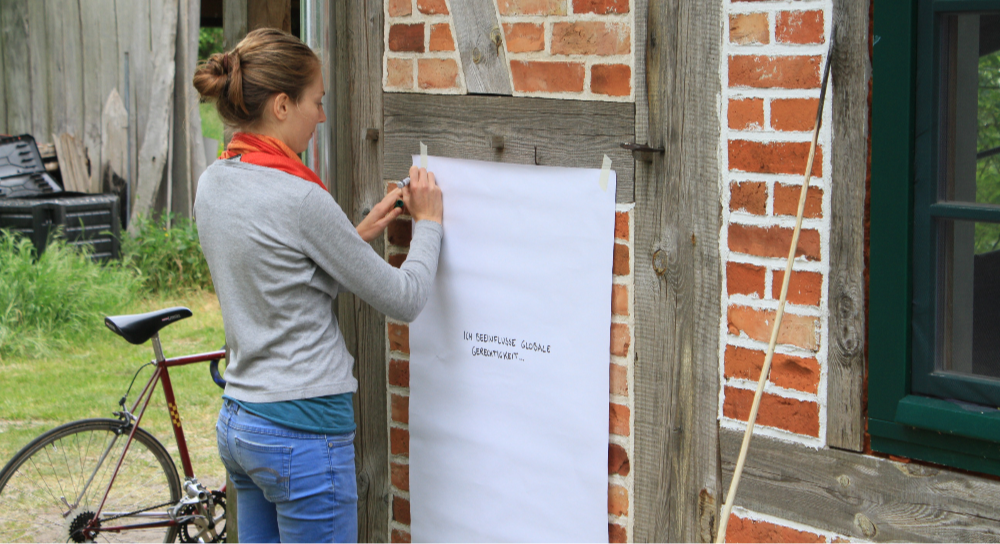Humboldt-Scholarship
Bachelors & Masters
2018-19 Sustainability in Humboldt’s Canteens
What is sustainable action? Have consumption patterns in the canteens of the StudierendenWERK Berlin changed? How do discourses represent and shape public attitudes towards sustainability measures? How can the acceptance, effectiveness, and legitimacy of such measurements be increased? These were just four questions that the 2018-19 cohort of the Humboldt Scholarship answered in close collaboration with the StudierendenWERK Berlin. Find the groups’ individual reports below.

Ayberk Coskun, Li Kathrin and Kaja Rupieper
The Studierendenwerk in Berlin intended to reduce paper cups as part of their sustainability-strategy. For this cause the canteen is advertising since 2012 the topic with the campaign “porcelain instead of paper”. With posters and the CampusCup, it aims to reduce the “to-go-consumption”. Moreover the canteen works since 2015 with a sale- and markup price policy.
With a quantitative and a qualitative breakdown the research group aimed to find out, if a sustainable change in behavior patterns could be introduced. They examined sales figures as well as opinions of the students in order to find out the motivation behind a potential change in behavior patterns. The aim was to identify behavior patters and acceptance of price markups. The disciplines of social science and economics were involved. Read final results (in German) here: Empirische Forschungsgruppe: Wegwerfbecher im Studierendenwerk Berlin Wie müssen umweltpolitische Maßnahmen gestaltet sein, damit sie eine nachhaltige Verhaltensänderung bewirken?
Nick Küspert and Konstanze Möller
This group defined an abstract definition for the technical terms of external determination and self-determination. They aimed at defining a field of measurements that allowed classification of the group projects of this year’s cohort. The students constructed distinct definitions for measurements that allowed classification actions for sustainability and attempted to adjust non-empirical research with empirical research data and test definitions on the measurements of the cohort’s projects. The key disciplines were Philosophy, supplemented by Law, Economics and Resource Economics.
How do discourses represent and shape public attitudes towards measures of sustainability? This question was to be answered through the method of a discourse analysis. The students examined the discourse presented by major news media in Germany after the introduction of a so-called ‘Veggie day’ by the Green party during its campaign for the parliamentary election in 2013. They also aimed at contributing to the macro level of the collective research project of the Humboldt Scholarship by giving an example for political approaches on the sustainability issue and how difficult their presentation to the public can be. The understanding of the dynamics of the discourse on this matter in the past might help to optimize political communication on similar matters in the future and broaden support for sustainable policies. The methodological approach was sociological, however the disciplines involved ranged from Law to Gender Studies.
Samyra Hachmann, Antonia Sladek, Martha Frittrang, Konstanze Möller
This group extended the discourse analyzis of the Veggie-Day debate. They were interested in measurements that exclude meat (and/or other CO2-intensive food) entirely from their menu, in certain periods of time or in entire canteens. They collected objectives about the acceptance of such experiences. The question was: How could the acceptance – combined with effectiveness and legitimacy – of such measurements be increased? In order to collect experiences, the group sent questionnaires to all German student services and did research online, as well as interviews via telephone, which asked about Veggie- and climate-days in university canteens and weekly offers, as well as opinions about parcipating in food options. Results were handed over to StudierendenWERK BERLIN (student service), which opened the possibility of further research with collaborative experiments. The disciplines involded included european ethnology, integrated natural resource management, philosophy and law. The final report of the project was published as a Discussion Paper and can also be read here: Maßnahmen zur nachhaltigen Ernährung in öffentlichen Kantinen.


